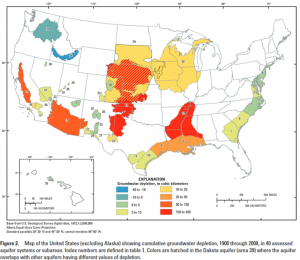Less than a mile away from the Law School, some of the country’s most important work is taking place at the Global Water Center, led by the Water Council. Water may seem like a basic right to most Americans, but across the globe, it is often a precious commodity. This will soon become a new reality in the water rich Midwest, as the demand on area water resources leads to an increasingly critical supply. The U.S. Geological Survey reported that pumping of groundwater in the Chicago-Milwaukee area from 1864 to 1980, has lowered groundwater levels by as much as 900 feet. Below is a map that illuminates the critical depletion affecting U.S. ground water supplies.
From Groundwater Depletion in the United States (1900-2008), USGS Scientific Investigations Report 2013-5079.
Facing the critical groundwater depletion taking place across the country over the last 100 years, Milwaukee non-profit, the Water Council, is rising to meet the challenge. The Water Council is dedicated to solving serious global water challenges by supporting innovation in freshwater technology and driving new solutions to a world that increasingly needs them. The Council has led the way through impressive collaboration—connecting 238 water technology businesses and a leadership network of 200 members from around the world. This expertise has included input from several Marquette University departments, including Marquette University Law School.
Marquette Law School’s Water Law and Policy Initiative has partnered with the Water Council on a variety of programs. Led by Professor David Strifling, the initiative assesses the legal aspects of water policy and facilitates collaboration between experts to provide information on the legal and policy aspects of critical water-related issues. The initiative brings very important but often unnoticed legal policies to the forefront. From Wisconsin strengthening its position on the public trust doctrine, to the effect of water policy on conflict in the middle east. The combination of scientific and legal work being done at the center is an effective method for reaching the Water Council’s goals and implementing them through the legal landscape.
Dr. Krassi Hristova is the director of the Marquette space in the Global Water Center and is leading efforts to study the area’s water resources. As she took me on a tour of the facility, I noticed a variety of water samples sourced from a variety of local waters, like Bradford beach and dairy farms in Kewaunee county. Dr. Hristova went over a significant number of studies taking place in the Marquette labs at the Global Water Center. These studies address a number of water issues that not only the area is facing, but also the entire country. From widespread drought in California to lead pipes poisoning Milwaukee’s children, the water issues facing us are growing at a rapid rate. Marquette’s research is key to understanding the issues and finding a solution.
In addition to Marquette, several companies and universities maintain offices in the Global Water Center, keeping them at the center of the action. Veolia Water NA, Badger Meter, Michael Best & Friedrich LLP, and A.O. Smith Corporation are among the prominent companies that have a presence at the Global Water Center. Their presence allows them to connect with the Water Council’s resources as well as talent from local universities. One of the initial investors was prominent law firm Michael Best & Friedrich, LLP. The firm was one of the first backers of the Water Council and was eager to partner with one of the most powerful water technology hubs in the world and views Marquette’s partnership with the Water Council as a great resource for the law school.
The Global Water Center is a key resource for Milwaukee in furthering its goal to attract creative talent and innovative ideas. By helping people and companies better use their water resources, Milwaukee has an opportunity to become a key player in the global economy.
